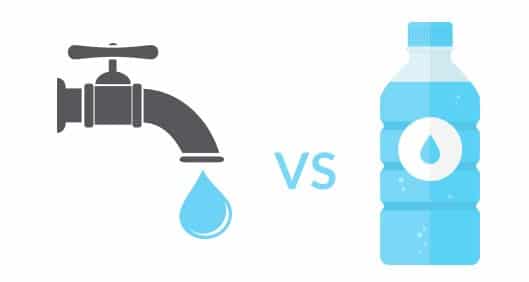In 2013, Canadians drank 2.4 billiion litres of bottled water! 1 Bottled water has become a popular choice because it is healthy, calorie-free, and convenient! However, there has been much controversy over whether bottled water is better and safer than tap water.
Let’s take a closer look at the facts…
Your wallet
- Bottled Water:
- Can cost Canadians anywhere from $0.08 per 500 mL bottle in bulk to as much as $2.50 for a bottle of water purchased from a vending machine which is the majority of bottled water purchases.
- This makes bottled water even more expensive than gas!
- Tap Water:
- Costs only tenths of a cent per liter!
your health
- Bottled Water:
- The responsibility of bottled water in Canada is shared by Health Canada and the Canadian Food Inspection Agency (CFIA). Bottled water is considered a food product and is regulated under the Food and Drug Act and Regulations.2
- Health Canada establishes health and safety standards for bottled water as well as labelling policies. The CFIA develops the packaging, labelling, and advertising standards these products must meet. The CFIA also conduct all the inspections for bottled water.2
- It is estimated that Canadian bottling plants on average only receive inspection once every 3 – 5 years. In addition, there have been 29 recalls of 49 bottled water products made by the Canadian Food Inspection Agency) since 2000. 3
- Bottled water can be produced from municipal tap water that has been treated to lower mineral content and/or remove chemicals, such as chlorine, to improve taste.2 It is estimated up to 25% of bottled water is produced from municipal tap water.1 However, if the bottled water is labelled as “mineral water” or “spring water” it is not allowed to be made from municipal water sources.2
- Tap Water:
- All levels of government share the responsibility of ensuring drinking water provided to Canadians is safe to consume.4
- The federal government plays a key role by leading the development of “Guidelines for Canadian Drinking Water Quality” document which outlines the maximum concentrations that are allowed for various microbiological, chemical, and radiological substances found in water that could potentially or are known to be harmful to human health. They also provide scientific and technical knowledge to provincial and territorial governments through the Federal-Provincial-Territorial Committee on Drinking Water.
- Provinces and territories are in charge of regulating the drinking water systems. This includes setting quality standards and managing source waters, treatment plants, and distribution systems.
- Municipalities are responsible for the actual treatment and distribution of drinking water to the public, except for home owners who access drinking water from a source on their own property such as wells. These individuals are solely responsible for the safety of their drinking water and should have their water tested regularly.
- Overall tap water goes through vigorous process of cleaning, filtering, and testing.3 In addition, fluoride is added to protect teeth from acids that cause tooth decay and cavities.5
- Chlorine is commonly added to municipal water supplies to eliminate harmful bacteria, however, it can leave the water with an unpleasant taste and/or smell even though only small amounts of chlorine are added. A simple way to remove this unpleasant taste and smell is to fill an uncovered glass container with water and put it in the fridge overnight. Much of the taste and smell of the chlorine will leave the water overnight! 6
- Tap water is tested frequently for a wide range of contaminants. For example, the city of Ottawa tests their water over 125,000 times per year and the city of Toronto checks water for bacteria every 4 – 6 hours! 3
- Unfortunately, in 2014 13 % of household water tests in Toronto revealed unsafe levels of lead in the tap water. This leached from old lead pipes, a material commonly used for water service pipes before the 1950s. This shouldn’t discourage the public from drinking tap water rather it should encourage people to have their water tested, especially if their home was built before the 1950s, and to replace pipes if lead pipes are found. 7
- All levels of government share the responsibility of ensuring drinking water provided to Canadians is safe to consume.4
the environment
- Bottled Water:
- Bottled water requires 2000 times more energy than tap water. It takes about 3 L of tap water to produce only 1 L of bottled water.
- The amount of oil used for the production of bottled water in 2010 was the same as putting 1 million cars on the road! All of the carbon dioxide, sulfur dioxide, and nitrogen oxides that are emitted into the air by water bottle production contributes to acid rain and global warming.
- Once the bottled water is produced, if it does not originate from municipal sources, it travels very long distances to make it to you, burning millions of barrels of oil in the process. For example, FIJI water travels over 12,000 km to reach Toronto.
- Finally, although water bottles are recyclable, it is estimated that 86% of water bottles are not recycled in Ontario!
- Tap Water:
- Is only transported from the municipal water supply meaning it usually travels less than 10 km to make it to you!
- Plus, no packaging is needed to deliver tap water to you!
It is no question that tap water is more environmentally and cost friendly than bottled water. Tap water and bottled water appear to be similar in terms of safety and quality – both are safe to consume.
____________________________________________________________________________________________________

